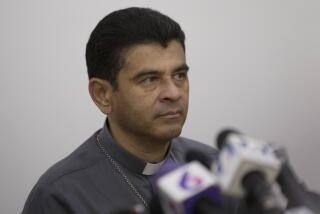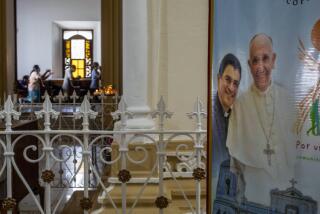Sandinistas OK Return of Religious Broadcasts
- Share via
MANAGUA, Nicaragua — The Sandinista authorities will allow Nicaragua’s Roman Catholic radio station to resume religious programming today but have continued a five-week-old ban on its newscasts.
The decision, announced Thursday, marked a narrowing of last month’s clampdown on critics of the revolutionary government. Thirty-eight people arrested at a violent anti-Sandinista rally July 10 are still in jail awaiting trial, but the three other news outlets that were closed since then have reopened.
Cardinal Miguel Obando y Bravo appealed for an end to censorship after the government barred all radio stations from broadcasting his outdoor Mass following a major religious procession last Sunday.
In response, the Interior Ministry late Wednesday moved to end a direct conflict with the popular primate by withdrawing a decree that had silenced Radio Catolica since July 11. But the station was ordered in writing to “transmit only religious programs” for an indefinite period.
Alberto Carballo, the station’s general manager, said Thursday that the church had sought to resume newscasts and political commentary. “The government chose the lesser of two evils,” he said.
On-the-Scene News
Radio Catolica was closed for its on-the-scene accounts of the July 10 rally in Nandaime, which ended in violent clashes between dissidents and the Sandinista police.
The Interior Ministry charged that the radio violated Nicaragua’s censorship law with reporting that was false and a “threat to internal security.”
Carballo acknowledged that the station erroneously reported that police in Nandaime used poisonous mustard gas--in fact, they used tear gas--but he said a correction was broadcast the same day.
The government expelled the U.S. ambassador and seven other American diplomats, accusing them of helping plan the demonstration. La Prensa, the opposition newspaper, was closed for two weeks for publishing stories that contradicted official accounts of the clashes, and the nation’s largest private business was seized. Two other opposition stations were closed for several days.
The crackdown, which came a month after the collapse of peace talks between the Sandinistas and the anti-government Contras, halted the government’s steps toward democracy under a Central American peace accord. Among those steps were the reopening of La Prensa and the Catholic radio station last October after more than a year of forced shutdown.
Sandinista officials have said in recent interviews that they cannot permit a free political climate as long as the Contra army and the internal opposition stage what they call a violent, U.S.-backed conspiracy to undermine their revolution.
President Daniel Ortega told reporters Thursday that Radio Catolica, through its news broadcasts, “was acting like a spokesman for the counterrevolution.”
“The logical thing is to open the Catholic radio with its message of God and not with its message of death, its message of terrorism,” Ortega said in explaining the government’s decision.
Carballo acknowledged that his station, like others still on the air here, had broadcast interviews with Contra officials from their Miami headquarters. But he added: “As long as there is the possibility of a peace agreement, we have a responsibility to inform the people of (the Contras’) political positions. This does not make us their mouthpiece.”
Carballo said he suspected that the station was shut as part of an attack on the church hierarchy. He said that Sandinista officials were angered by an unusually critical pastoral letter from the nation’s bishops in late June. While calling for a resumption of peace talks, the letter said Nicaraguans “feel defrauded by their leaders” because of a deepening economic crisis.
Demonstration Target
The government has since launched a propaganda campaign against two Catholic priests who have delivered critical homilies. Cardinal Obando has been the target of a demonstration, every Thursday for the past five weeks, by pro-Sandinista mothers demanding that he denounce the U.S.-backed rebel movement.
In response, Obando this week asked two anti-Sandinista members of the National Reconciliation Commission, which he heads, to contact Contra leaders and apply pressure for the freedom of 66 war prisoners the rebels promised last spring to release.
More to Read
Sign up for Essential California
The most important California stories and recommendations in your inbox every morning.
You may occasionally receive promotional content from the Los Angeles Times.










